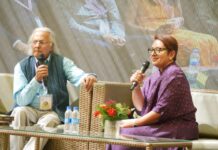
Photo by Chandra Bodalia
UJJAL Dosanjh will be the recipient of the first Wallenberg-Sugihara Civil Courage Award by the Wallenberg-Sugihara Civil Courage Society on January 18 at the 10th Annual Vancouver Raoul Wallenberg Day. Lieutenant Governor Judith Guichon will be present.
The Civil Courage Award is given to an individual associated with British Columbia, who at personal risk helped improve the lives of others and society, while defying unjust laws, norms or conventions of the time and place as exemplified by Raoul Wallenberg and Chiune Sugihara.
Dosanjh will receive the award “for his actions as a critic of sectarian violence and his advocacy for social justice, often at great risk to his personal safety.” The society said: “He spoke out against terrorism within the Sikh community. For his stand, Mr. Dosanjh was attacked with an iron bar and almost killed. He recovered and went on to become attorney general, the first Indo-Canadian provincial premier and subsequently, the federal minister of health. As a critic of extremism and champion of liberal democracy he has been a great benefit to Canada and an inspiration to us all.”
The annual Wallenberg Day event pays tribute to the courageous and heroic actions inspired by Raoul Wallenberg and Chiune Sugihara, who engaged in selfless acts of civil courage, at grave risk to themselves, their families and their future by choosing to follow their own personal moral code thus saving the lives of large numbers of Jews during WWII. Their names stand as a symbol for all such courageous and heroic acts.
This year’s event will include screening of the film “The Rescuers”, from Emmy Award-winning filmmaker Michael King, which uncovers the largely unknown stories of 13 heroic and courageous diplomats who, at tremendous personal cost, saved tens of thousands of lives during World War II. The film follows Stephanie Nyombayire, a young Rwandan anti-genocide activist who lost 100 family members in the 1990s Rwandan Genocide, and Sir Martin Gilbert, the renowned 20th century and Holocaust historian, as they travel across 15 countries and three continents interviewing survivors and descendants of the diplomats.













